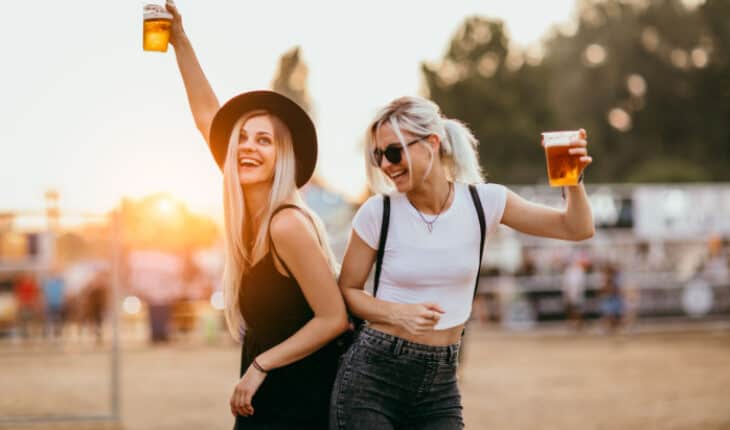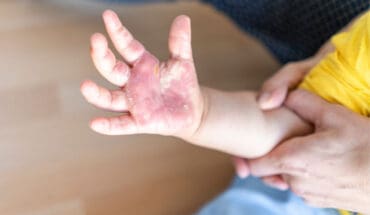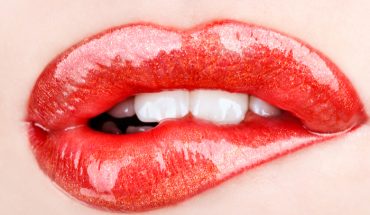This article will look at two common hazards when attending festivals: dehydration and spiking. It provide ways to spot the symptoms of each and also how to deal with each issue.
The importance of staying hydrated
The most common cause of collapse at music festivals isn’t usually directly due to the substances people have taken, but because of one they haven’t – water. According to our team, a veteran paramedic regularly working at these events, the majority of people requiring medical treatment at festivals are suffering from acute dehydration.
Many teenagers are just not aware of the importance of drinking water – particularly in hot sweaty conditions and when drinking alcohol or taking drugs (both powerful diuretics). Festival conditions conspire to make drinking water less of a priority. Food and drink prices can be high at festivals meaning cost-conscious teenagers may want to save their funds to buy alcohol. The excitement and distraction of live events can make it hard for teenagers to remember to stay hydrated.
And at a festival it can be even more crucial to top up your H20 levels to boost water lost through drinking alcohol and taking drugs which can cause overheating and serious dehydration. Or to combat dehydration caused by too much sun. Add to this staying up late, partying hard and camping – it all takes their toll on self-care.
These days many festivals, such as Reading and Glastonbury, have their own mobile on-site A&E units. This is where festival goers who collapse are treated. They are given water to rehydrate them and a cool place to recover. Many of them are also suffering from heat exhaustion and receive advice on how to stay hydrated for the rest of the festival.
Symptoms of dehydration
The symptoms of dehydration are: feeling thirsty or tired, headaches, passing dark or strong smelling urine, feeling dizzy or light headed, peeing little – fewer than 4 times per day, suffering from dry mouth, lips and eyes and collapse.
Your risk of becoming dehydrated is increased if you have drunk too much alcohol, taken drugs, been in the sun for too long or been vomiting or had diarrhoea – all highly likely at festivals.
At its most severe, dehydration can lead to confusion and disorientation, a weak and rapid pulse and seizures and requires hospital treatment.
Up your water intake immediately if you feel dehydrated. Make sure you drink fluids in small sips, increasingly your intake gradually. Try to eat high water content foods such as ice lollies or fruits such as watermelon. Water itself is great, but you can also drink sports drinks or supplement with oral rehydration sachets.
Being aware of the risks and symptoms of dehydration can help festival goers stay safe this summer. Here at First Aid For Life, we run first aid courses for teenagers to give them the confidence of knowing how to keep themselves and others safe when it really matters.
We are also happy to run bespoke groups for teenagers to get them first aid trained and festival-ready.
So, if you are heading off to a festival this summer, or if you are packing off your teenager to experience their first festival, make sure that alongside the hot pants and wellies, you also pack sunscreen and plenty of water.
Spiking
Whilst it is important to stay hydrated, it is also imperative to be aware of what you’re drinking.
You will have heard the horror stories about spiking incidents while at festivals but unfortunately more and more young people are becoming victims of this horrible form of abuse. Official statistics on spiking are not regularly published, but in December 2022 the National Police Chiefs’ Council said that between September 2021 and September 2022 nearly 5,000 cases of needle and drink spiking incidents were reported across England and Wales. Many more cases likely never reported.
Make sure you know what to look out for and how to keep yourself safe.
So what is spiking?
‘Spiking’ is when someone puts alcohol or drugs into another person’s drink or their body without their knowledge or consent.
Different types of spiking can include the following substances being added to drinks:
- Alcohol
- ‘Date rape’ drugs
- Illegal drugs
- Prescription drugs (e.g. stimulants, tranquilisers, sedatives, opiates)
Drink spiking can happen to any type of drink, whether alcoholic or non-alcoholic. This is why it is so important to be vigilant of what you are drinking. Even if you are trying to hydrate yourself, there is always the danger that someone has slipped something into your drink.
There are various reasons why someone might decide to ‘spike’ another person. It makes it easier for someone to commit a violent crime or assault their victim, or could be intended as a ‘joke’. Motives may include:
- Rape, sexual assault or sexual abuse
- Non-sexual assault
- Robbery
Spiking is a crime
It is never the victim’s fault!
Spiking someone in order to commit a violent or sexual offence against them is a serious crime – no matter whether any sexual offence took place. It carries a maximum sentence of 10 years in prison in England and Wales.
If the aggressor also committed a sexual offence against the victim they spiked, they will face additional charges.
How to know if you have been spiked?
The effects of drink spiking vary depending on the substance. However, symptoms could include:
- Lowered inhibitions
- Loss of balance
- Feeling sleepy
- Visual problems
- Confusion
- Nausea
- Vomiting
- Unconsciousness
The symptoms will depend on lots of factors such as the substance or mix of substances used including the dose, your size and weight, and how much alcohol you might have already consumed.
Better to be safe than sorry
- Always buy your own drink and watch as the person pours it.
- Don’t accept drinks from strangers.
- Never leave your drink unattended while you dance or go to the toilet.
- Don’t drink or taste anyone else’s drink.
- Throw your drink away if you think it tastes strange or different.
What should you do if you suspect someone has been spiked?
- Tell a bar manager, bouncer, or member of staff.
- Calm and reassure the individual.
- Keep them warm and comfortable in a safe stable location.
- DO NOT induce vomiting.
- Monitor the individual and ensure they are breathing steadily and are responsive to you.
- Check for further injuries.
- Take them to A&E or call 111.
- If the individual continues to deteriorate, loses consciousness, continues breathing irregularly, or even stops breathing call 999 immediately.
- If someone is unconscious but breathing, and has no other injuries place them in the recovery position until help arrives.
- If someone stops breathing start to administer CPR.
What can venues do?:
Some venues responded by introducing measures such as protective drinks covers, increased entry searches, and ‘women only’ evenings.
Some festival organisers have also set up tents where you can go to test your drinks for dangerous substances.
In response to the rise in spiking, Nottingham Trent University by increasing security for events at its students’ union. They also introduced Safe Places between 9pm and 9am across their campuses. Furthermore they provided bystander intervention training to staff in university venues and night-time venues across the city to prevent sexual violence.
Want to know more? Read this extensive survival guide for festivals!
- What is a seizure? - 13th March 2025
- Febrile Convulsions and Seizures in Children - 13th March 2025
- Why women are less likely to receive CPR or survive cardiac arrest - 6th March 2025






